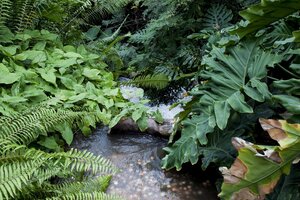~ecology-news-biolog | Bookmarks (424)
-
In the heart of vanilla country, farmers on the front lines of climate change struggle to adapt
As erratic weather upends the seasonal rhythms that crops depend on, farmers in the island nation...
-
Mariana Trench expedition discovers new lifeforms flourishing in deep-sea environment
Shanghai Jiao Tong University along with multiple collaborating institutions including the University of Copenhagen and Lawrence...
-
Whales move nutrients from Alaska to Hawaii in their urine, supporting tropical ecosystems
Whales are not just big, they're a big deal for healthy oceans. When they poop, whales...
-
Shells of their former selves: How sea snails have adapted to invasive predators
Over the past two decades, the Gulf of Maine has become a popular landing spot for...
-
First national analysis finds America's butterflies are disappearing at 'catastrophic' rate
America's butterflies are disappearing because of insecticides, climate change and habitat loss, with the number of...
-
Tooth size in South American sea lions reflects historical shifts in population abundance
A new study published in PeerJ reveals that the teeth of South American sea lions (Otaria...
-
Pollinator diversity in urgent need of protection to ensure ecosystems function properly
Pollinators are animals that help to transport pollen from one location to another in the plant...
-
Nearly half of popular tropical plant groups related to birds-of-paradise and bananas are threatened with extinction
A new analysis from researchers at the Smithsonian's National Museum of Natural History reveals that nearly...
-
Scientists develop advanced forest monitoring systems: Will forests monitor themselves in the future?
KTU researchers are proposing an innovative forest regeneration model and a sound analysis system that can...
-
The changing chorus: How movements and memories influence birdsong evolution
New research from the University of Oxford has provided fresh insights into how bird songs evolve...
-
How plants control partnerships with fungi: Study finds stress hormones influence symbiosis
How do symbioses between plants and fungi develop? How do plants decide whether or not to...
-
'Icarus of the deep': How a dying anglerfish became a social media sensation
In February, researchers from conservation organization Condrik Tenerife were about two kilometers off the coast of...
-
Tropical forests in the Americas are struggling to keep pace with climate change, study reveals
Tropical rainforests play a vital role in global climate regulation and biodiversity conservation. However, a major...
-
Large-scale analysis reveals 20% of butterflies in the US have disappeared since 2000
Butterflies are beloved creatures that inspire art and play an important ecological role, but according to...
-
Sticky situation? Insights into what holds antibiotic-resistant biofilms together
Biofilms, ubiquitous bacterial communities embedded in a slimy matrix, are the oldest form of multicellularity on...
-
The yucca and the moth: How extreme weather impacts the timing of biological events
Whether it is flowers sprouting in the spring, cicadas mating in the blistering heat of summer,...
-
Fifty years of songbird maps take flight in new hands
Miranda Zammarelli, Guarini, was a graduate student at Dartmouth for just nine days when her interests...
-
Guinea baboons possess information about the skillfulness of others and use it strategically to their advantage
A research team led by William O'Hearn from the German Primate Center—Leibniz Institute for Primate Research...
-
Satellite image analysis delivers new insight into the functional diversity of tropical forests
Satellite images from space are allowing scientists to delve deeper into the individual functions of different...
-
Amphibians are increasingly vulnerable to global warming, heat tolerance study shows
Scientists will be able to better identify what amphibian species and habitats will be most impacted...
-
After 120 years of conservation efforts, Yellowstone bison are a single breeding population, researchers discover
Researchers from the Texas A&M College of Veterinary Medicine and Biomedical Sciences (VMBS) have discovered that...
-
Genetic mixing: The secret to killer whale resilience and adaptability
An international team of marine biologists have published research in Molecular Ecology that shows the benefits...
-
Ancient DNA reveals 6,000 years of the lives of Antarctic penguins
Analysis of sedimentary ancient DNA has illuminated 6,000 years of the lives of Adélie penguin colonies...
-
Moth collected in 1855 is key to describing 11 new species
Scientists at the Natural History Museum (NHM), London, have discovered that a long-overlooked moth specimen in...
















